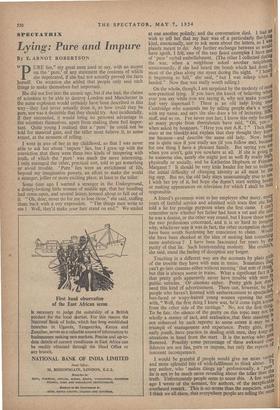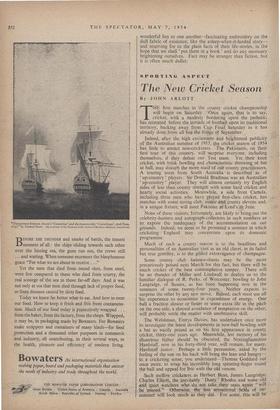SPECTATRIX
Lying: Pure and Impure
By E.ARNOT ROBERTSON 661, URE lies," my great aunt used to say, with an accent on the ` pure,' of any statement the contents of which she deprecated, if she had not actually proved the facts herself. On occasion she added that people only said such things to make themselves feel important.
She did not live into the atomic age, but if she had, the claims of scientists to be able to destroy London and Manchester in the same explosion would certainly have been described in this way—they had never actually done it, so how could they be sure, nor was it desirable that they should try. And incidentally, If they succeeded, it would bring no personal advantage to the scientists themselves, apart from making them feel impor- tant. Quite young I realised that a ` pure ' lie could not be told for material gain, and the teller must believe it, to some extent, at the moment of telling.
I went in awe of her in my childhood, so that I was never able to ask her about ` impure ' lies, but 1 grew up with the conviction that there were these two kinds of tampering with truth, of which the ` pure ' was much the more interesting. I only managed the other, practical sort, told to get something or avoid trouble. ` Pure' lies were an enrichment of life, beyond my imaginative powers, an effort to make the world a stranger, jollier or more exciting place, at least to the teller. at one another politely, and the conversation died. 1 had .116 wish to tell her that my hair was of a particularly flat-lying kind, emotionally, nor to ask more about the letters, as I was plainly meant to do. Any further exchange between us would have spoilt, I felt, one of the two finest examples I have Met of ` pure ' verbal embellishment. (The other I collected during the war, when a neighbour asked another neighbour, unnecessarily, if she had heard the bomb which had done most of the glass along our street during the night. "I hear, it beginning to fall," she said, " but I was asleep when landed." Now that was really worth telling.) On the whole, though, I am surprised by the modesty of mos' non-practical lying. If you have the knack of believing will ever you say while you are saying it, why not make yourse_, feel very important ? There is an old lady- living no' Cambridge who astounds me by telling people she's a with my name, and says she also does a bit of lecturing, BB stuff, and so on. I've never met her; I know this only becausi so many people from thereabouts have said, " Oh, yes-' when asked by hostesses, " Have you met A.R. ? " Then they stare at me blankly and explain that they thought they knell me because—and describe the same old lady. Now, being me is quite nice if you really are (if you follow me), because) for one thing I have a pleasant family. But saying you ar° when you aren't, gets you nowhere at all. If she is going t° be someone else, surely she might just as well fly really WA physically or socially, and be Katharine Hepburn or Princea Margaret It should be very little harder for her to believe', the initial difficulty of changing identity at all must be th° big step. But no, the old lady stays unassumingly true to Me. I wish her joy of it, but hope she doesn't start writing book or making appearances on television for which I shall be het responsible. A friend's governess went to her employer after many. mail years of faithful service and admitted with tears that she ha, told a lie for prestige purposes when she first came. 1 can remember now whether her father had been a vet and she sale) he was a dentist, or the other way round, but I know those we° the two professions concerned, and it is so 'hard to imagin why, whichever way it was in fact, the other occupation shoal have been worth burdening her conscience to claim. Woul she have been shocked at the idea of making him something more ambitious ? I have been fascinated for years by the) purity of that lie. Such heart-rending modesty. She couldnt) she said, stand the feeling of deception any longer. wonderful lies to one another—fascinating embroidery on the dull fabric of existence, like the asleep-when-it-landed story— and reserving for us the plain facts of their life-stories, in the hope that we shall ' put them in a book ' and do any necessary brightening ourselves. Fact may be stranger than fiction, but it is often much duller.











































 Previous page
Previous page